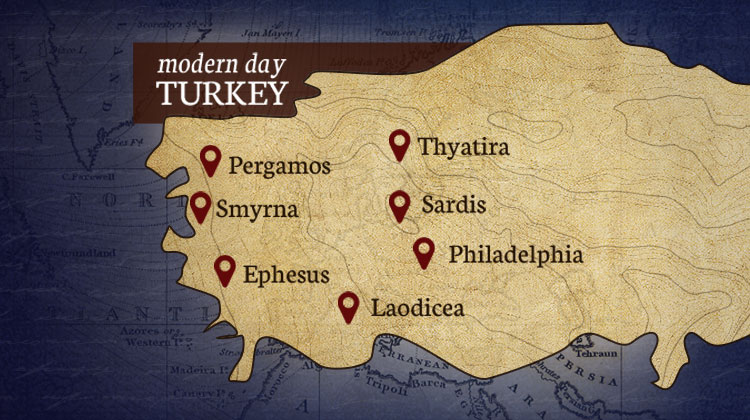Rome and the surrounding territories became increasingly hostile to Jesus’ followers after His death. According to tradition, every disciple, except one, was martyred for his faith, and that disciple’s fate wasn’t much better—John was exiled to a rocky, inhospitable island called Patmos. During this exile, Jesus Christ spoke to John in a vision. He revealed far-off future events, and He gave John messages for each of the seven churches in Asia Minor. Dotted with words of encouragement and correction, the Lord’s letters offer a promise “to him who overcomes.” Even today, they identify the kinds of struggles Christians face, and they teach us how to overcome trials.
We’ll study the context of the messages, what they meant for the original churches, and what they mean for us today.
Ephesus, Smyrna, Pergamos, Thyatira, Sardis, Philadelphia, and Laodicea were literal churches that existed in Asia Minor (modern Turkey) during the first century A.D. Named for their geographical locations, the churches were strategically located along a major Roman road.
1. Ephesus, the loveless church, was located at a major harbor on the Aegean Sea and housed one of the seven wonders of the ancient world (a temple to Artemis). Founded by Paul, this was the most prominent church in Asia Minor.
2. Smyrna, the home of Homer and the temple of Athena, was a beautiful, bustling seaport. In the second century A.D., Rome martyred Polycarp, its bishop.
3. Pergamos, the location of Rome’s provincial capital, was a major cultural hub that housed a library rivaling the famed Alexandrian library.
4. Thyatira, founded under Alexander the Great, was noted for its trade, particularly purple dye. Lydia, one of Paul’s converts, came from this region (Acts 16:14).
5. Sardis, the ancient capital of the Lydian kingdom, was situated atop a plateau and sustained a series of foreign conquests.
6. Philadelphia, the “Gateway to the East,” was renowned for its grapes, textiles, and leather goods.
7. Laodicea, the ancient capital of Phrygia, gained wealth through trade and banking. It was also known for its medical school and costly fabrics.
Nothing remains of these churches today. Persecution has been an ongoing threat to Christianity in Asia Minor, particularly since Constantinople fell to the Ottomans in 1453. Estimates place the current number of Christians at about two percent of Turkey’s population.1
The Role of the Churches (Revelation 1:9-13)
In Revelation 1, we find the apostle John in exile on the tiny island of Patmos. Having been the overseer of the churches in Asia Minor, he was banished from society by the Romans to reduce his religious influence (verse 9). Exile was a horrible sentence, second only to the death penalty. In this context of persecution, John received the most detailed vision of things to come given to any apostle.
When Christ appeared to John, he saw seven lampstands representing the seven churches. Standing among them was “One like the Son of Man” (verse 13). Jesus came as the “light of the world” (John 1:9; 8:12) and then commissioned us to be “the light of the world” (Matthew 5:14). John’s vision was a physical representation of this imagery. Christ was standing in His rightful place amid the churches.
Every church—then and now—has the opportunity to be a lampstand shining forth Christ’s light in a dark world. The churches do not create the light; they reflect it. Christ is the light.
Bearing His light in the world is the Church’s primary purpose.
John’s Vision of Christ (Revelation 1:13-20)
If you have ever wondered what Jesus of Nazareth looked like, you’re not alone. Biblically speaking, we do not know. The book of Isaiah contains the only reference to His appearance—more than seven hundred years before the Nativity. Isaiah described His appearance as average, not conspicuous in any way (Isaiah 53:2).
The resurrected Christ appeared much different to John. He had striking white hair that suggested the age, wisdom, and dignity befitting a judge. His eyes were “like a flame of fire”—eyes from whom nothing is hidden, eyes that will judge all mankind (Psalm 11:4; Hebrews 4:13). His feet “were like fine brass,” another symbol of judgment in Scripture.
John described two features of Christ’s mouth: the sound and the sword. Drowning out all other voices, His voice evoked thoughts of roaring waterfalls. Piercing soul and spirit, the sword represented the Word of God (Ephesians 6:17; Hebrews 4:12). When Christ returns, He will slay His enemies by His Word (Revelation 2:16; 19:15, 21).
In His right hand, Christ held “seven stars,” representing His authority (Matthew 28:18; Ephesians 1:20). I believe the stars stand for the pastors of the seven churches who received authority from Christ to lead their churches—not their authority, but Christ’s authority.
This vision of Christ was so awe-inspiring that John “fell at [Christ’s] feet as dead” (verse 17). He was not the first person to respond to God’s presence in this way. Abraham (Genesis 17:3), Moses (Exodus 3:6), Balaam (Numbers 22:31), Joshua (Joshua 5:14), Gideon (Judges 6:22-23), and others all demonstrated terror in the presence of pure holiness and righteousness.
No longer meek and mild, Christ will put all evil and all enemies under His feet when He returns. His messages to the seven churches serve as a warning of the judgment to come while extending hope and encouragement to all who will listen.
Ephesus—The Loveless Church (Revelation 2:1-7)
The church of Ephesus had many admirable qualities and one tragic flaw. Christ commended them for their good works, their perseverance, and their church discipline that guarded against false teaching (Revelation 2:2-3).
Verse 4 reveals where they went wrong. “Nevertheless I have this against you, that you have left your first love.” Everything about the Ephesian church looked good outwardly, but their heart wasn’t in it. James said, “Faith without works is dead” (James 2:26). Here, Jesus warns that having works without love is just as problematic. The church’s devotion to Christ was waning.
Christ provided a three-part solution for the church’s lovelessness.
Remember
“Remember therefore from where you have fallen” (Revelation 2:5). Think back to what your relationship with Christ was like when you were first saved. Reflect on what it felt like to trust Him with both the simplest and the greatest of your needs.
Repent
After remembering where you started and realizing where you are now, the next logical step is to repent. Turn away from your present course and turn toward Christ (Revelation 2:5).
Repeat
Repeating the original good works will help you get back to the place where you began, “Do the first works” (verse 5). Return to what you did when you first became a Christian—the spiritual disciplines that kept you close to Christ and motivated you to follow Him.
Christ warned the Ephesian church of the consequences if they did not follow this three-step formula: “I will come to you quickly and remove your lampstand from its place—unless you repent” (verse 5). That is, He would remove the church’s influence and power. There is a price to pay for drifting away from the Lord.
Smyrna—The Suffering Church (Revelation 2:8-11)
Christians in developed countries today think little about being persecuted for their faith, but there are churches in the world where oppression is a daily reality. Such was the case for the ancient church at Smyrna. Refusing to worship pagan gods or the Roman emperors, they experienced pressure, poverty, and persecution (verse 9).
Two of the seven churches received no rebuke from Christ, and Smyrna was one of them. Surrounded by one of the ancient world’s most beautiful cities, this congregation experienced the ugliness of oppression. Christ’s words to that church can prepare all believers for what might come.
Be Fearless
“Do not fear any of those things which you are about to suffer” (verse 10). Because Christ is Lord over all of life’s circumstances, we have nothing to fear. Paul wrote that nothing could separate us from the love of God in Christ Jesus (Romans 8:35-39). Fear is a natural human response, but we live supernatural lives through the power of Christ in us.

Be Faithful
“Be faithful until death, and I will give you the crown of life” (verse 10). Given the intensity of the persecution in Smyrna, I believe Christ was saying, “Yes, you may lose your life for My sake, but be faithful until the end.”
Pergamos—The Compromising Church (Revelation 2:12-17)
Pergamos was nicknamed “Satan’s City” because of its paganism and idolatry. Christ’s reference to “Satan’s throne” (verse 13) may have alluded to the city’s altar of Zeus. Built on the Acropolis, it was the most famous and ornate altar in the world—100 square feet, 40 feet high, with sculptures surrounding its base. Some historians have suggested that this altar was implemented in the martyrdom of Antipas (verse 13).
Professing faith in Jesus Christ carried severe consequences in this bedrock of pagan activity. The church demonstrated conviction and courage by its mere existence, yet idolatry had crept into its congregation. They had yoked the Gospel with paganism, drawing Christ’s stern rebuke: “Repent, or else I will come to you quickly and will fight against the promoters of Balaam and the Nicolaitans with the sword of My mouth” (verse 16).
This blending of beliefs has plagued God’s people since the days of early Israel, and it still exists today. Many churches have crumbled under the banner of toleration. Whatever Satan cannot curse and crush, he seeks to corrupt through compromise.
Christians are not called to be combative or antagonistic, but there is a better way than that chosen by Pergamos.
Maintain a Distinct Identity
Today’s Church has become so fixated on being relevant that it has become irrelevant. People in the world find little in local churches that is different, so they remain disinterested. Living out the Gospel will draw antagonism from some, but God will use it to save the rest (2 Timothy 2:8-10).
Speak the Truth in Love
Wherever corruption or compromise seeks a foothold, we need to be vigilant, sober, on guard, and to speak the truth in love (1 Peter 5:8; Ephesians 4:15). Our goal in confronting sin is not condemnation but reconciliation. A day is coming when Christ will judge every soul. Until then, we have a responsibility to lead people to the cross. Paul called this “the ministry of reconciliation” (2 Corinthians 5:18).
Remember the Lesson From Pergamos
Guard against the dilution of true doctrine. If that makes us intolerant in the eyes of some, then so be it. We cannot define truth by our preferences. It exists outside of popular opinion and does not bend to popular demand. If we hold fast to sound doctrine, Christ will commend us just as He did Antipas, His “faithful martyr.”
Thyatira—The Adulterous Church (Revelation 2:18-29)
Some Christians and churches feel a need to be all-inclusive when it comes to spiritual and moral boundaries. Evidently, the ancient church in Thyatira felt that way as well. On the surface, the church was commendable for its love, faith, service, and patience. But Christ, with “eyes like a flame of fire,” recognized their deficit (verse 18). The One “who searches the minds and hearts” pierced through their veneers and penetrated the heart of the problem—immorality. According to verse 20, it only took one person, a self-proclaimed “prophetess,” to corrupt the church.
What does Christ say to a church that tolerates immorality in its midst?
The Threat of Discipline (Revelation 2:22)
When the prophetess refused an opportunity to repent, Christ warned of His judgment: “Indeed I will cast her into a sickbed.” Whether taken figuratively or literally, those words are cautionary. God is holy and will not tolerate rebellion forever. As Hebrews 10:31 says, “It is a fearful thing to fall into the hands of the living God.”
The Threat of Death (Revelation 2:22-23)
Again, Christ’s warning may have been figurative or literal. His promise to kill the woman’s children may have referred to physical children born of her immorality or the spiritual children she seduced into her practices. This warning was not just to her but also to “those who commit adultery with her.” Christ was prepared to judge anyone associated with the woman’s immorality. Without repentance, they would find themselves in “great tribulation.”
The Message to the Christians (Revelation 2:24-25)
Not every believer in Thyatira was immoral. Some knew God’s holy standards and would not budge from them. The message for those who did not engage in the cult of immorality was to stand their ground—“hold fast what you have till I come” (verse 25).
The Message to the Conquerors (Revelation 2:26-29)
All who would choose faithfulness “until the end” would become conquerors. Christ promised that they would rule the nations with Him during the Millennium, and they would be raptured to heaven with Him—the “Bright and Morning Star”—before the Tribulation (Revelation 22:16).
Sardis—The Dead Church (Revelation 3:1-6)
In this message, Christ refers to Himself as “He who has the seven Spirits of God and the seven stars” (verse 1). The “seven Spirits” represent the completeness of the Holy Spirit’s ministry (5:6; Isaiah 11:2-5), which the church in Sardis had shut out of its affairs. The lights were on, and people showed up, but the power of the Holy Spirit was missing.
The other churches received praise from Christ along with His criticism. With this church, there were no commendations—only condemnation. “I know your works, that you have a name that you are alive, but you are dead.” The place was full of what we today would call “nominal Christians”—Christians in name only. Christ gave five instructions for the church that is dead.
Be Sensitive to Sin (verse 2)
We’re not only to be awake but to “be watchful.” From children’s classes to the pulpit, teaching must be in accord with God’s Word. Falling away from doctrine results in spiritual death.
Be Supportive of the Faithful (verses 2, 4)
In every age, God preserves a remnant of believers who need to be encouraged in their walk.
Be Submissive to the Control of the Holy Spirit (verse 3)
It is only by the ministry of the Spirit that we hear and receive the Word of God in a life-changing way. When the Spirit leaves, is grieved, or is quenched (Ephesians 4:30; 1 Thessalonians 5:19), a church dies. When a human spirit departs, its body dies—and the same is true of a church.
Be Subject to the Authority of God’s Word (verse 3)
“Hold fast” is usually tied to the Word of God. If a church keeps the Word, it means the Bible will be honored and taught faithfully. When a church abandons the Bible, it removes the Holy Spirit’s primary tool for transforming believers into the image of Christ.
Be Sorry and Repent of Sin (verse 3)
If you are wondering how to get back on track with God, the answer is always the same: repent. Turn back to the truth of God’s Word and turn away from sin. Churches die because of the sinfulness of their members. Buildings cannot repent, but churches atone through the repentance of their members.
For all its shortcomings, Christ offered hope to Sardis: The church could experience eternal life if it returned to obeying His commands (verses 5-6). There are no Christians in the area today, but archeology offers hope that Sardis repented. A Byzantine church, which now lies in ruins, was built in the city hundreds of years after John’s death.2
Philadelphia—The Faithful Church (Revelation 3:7-13)
Christ commended the church in Philadelphia for four things: they had an open door, they had a little strength, they had kept the Word of God, and they had not denied the Lord. If we want to be commended by Christ like this church, we will go through open doors of ministry, depend on His strength, and be faithful to Him and His Word. What does this mean for us today?
The Potential of the Local Church
If Christ is present and the church is committed to Him, there will be a door of opportunity for ministry. Every church should pray for those doors to be recognized, opened, and walked through.
The People of the Local Church
Today, many churches think there are too few people with too little money, too few gifts, and too few opportunities. But remember this truth: When we are weak, Christ is strong. Building the Church of Jesus Christ is not up to us. We depend on the Head of the Church to give His Body the strength it needs.

The Principles of the Local Church
In verse 8, Christ summarizes three principles that apply to every church: open doors for ministry, depending on Christ’s strength, and keeping the Word of God. Being faithful to God’s Word will lead to open doors for ministry and dependence on Christ’s power. When the Word of God is the priority, everything else will fall into place.
The Priorities of the Local Church
Because the Church belongs to Christ, we are to identify boldly with Him regardless of the cost. We proclaim His Name as the Bible does—the only Name whereby we can be saved (Acts 4:12).
Laodicea—The Lukewarm Church (Revelation 3:14-22)
The Lord directed some of the harshest words recorded in the Bible at the church in Laodicea. He said the church made Him ill (Revelation 3:16). Lacking in every way, it was compromising, conceited, and Christless.
Today’s Church should take note; those words may apply to us as well.
The Prescription for Spiritual Poverty
The Laodiceans were financially wealthy yet spiritually bankrupt. They lacked spiritual riches, which only come through Christ (Revelation 3:18).
When God blesses Christians with prosperity, He expects Christ-centered stewardship. A Christian with wealth bears a burden of responsibility to discover God’s purpose in blessing him with that wealth—and to use it accordingly.
The Prescription for Spiritual Nakedness
Nakedness in Scripture is a metaphor for defeat and humiliation. The Laodiceans pretended to be clothed in righteousness, but in fact, they were naked, lacking righteous acts. Instead of being on fire for the Lord, they were lukewarm. Therefore, Christ counseled them to procure “white garments” from Him so that their shame might be covered (Revelation 3:18).
The Prescription for Spiritual Blindness
By calling the Laodiceans “blind” (verse 17), Christ was presenting a paradox. The city was famous for its export of a powder that created an eye salve when mixed with water. (It even had some medical benefit.) Yet the Laodicean church had lost its spiritual perception.
The only salve for spiritual blindness is repentance and submission to the Lord Jesus Christ, asking Him for the wisdom of His Spirit to restore our spiritual sight.
The Prescription for Spiritual Compromise
There is only one word of counsel for the spiritually compromised: “Therefore be zealous and repent” (Revelation 3:19). But Jesus also puts those firm words in context: “As many as I love, I rebuke and chasten.”
Good parents discipline the children they love. But have you ever seen a parent give up on a child? Maybe they throw up their hands and walk away. It’s heartbreaking. We can be glad God doesn’t do that. He loves us too much to leave us the way we are, and He wants us to come back to Him when we need to.
Receive Daily Devotions from David Jeremiah
Sign up to receive email devotions each day!
The Prescription for Their Christlessness
Christ does not barge into churches where He is unwelcome—He waits for an invitation. “Behold, I stand at the door and knock. If anyone hears My voice and opens the door, I will come in to him and dine with him, and he with Me” (Revelation 3:20). Apparently, there were even fewer believers at Laodicea than there were at Sardis—His invitation extends to anyone who hears His voice.
From a prophetic perspective, Laodicea is a picture of the Church in the Last Days. It is sad to imagine Christ standing outside His own Church, but we need to ask ourselves if it is a picture of us. Has the Lord been pushed out of our assemblies? Has His Word been compromised in our pulpits? Are we too busy with plans and programs to even notice that we have crowded Him out? If Christ is knocking at the door of your heart or your Church, do not delay—invite Him in.
Study Questions
- If you had been John on the island of Patmos, how would you have responded when Jesus appeared in all His glory? After the shock of seeing Him, would you have worshiped Him or cowered in fear for having ignored Him in your life? Jesus’ words to John are His words to you today: “Do not be afraid; I am the First and the Last. I am He who lives, and was dead, and behold, I am alive forevermore. Amen. And I have the keys of Hades and of Death.” Make sure you have taken Jesus’ words to heart.
- If the Bible gives no attention to Christ’s earthly appearance, is there an application for Christians? How do we find balance in a world that focuses so much on outward appearance?
- Why did Paul say we “glory in tribulations”? (Romans 5:3-5) If Christ allowed His apostles to suffer for Him, should we be surprised when we suffer as His followers? Why or why not?
- Read Acts 19—20. What additional information do you find about the Ephesian church? What did the church’s response to Paul say about its relationship with him and the Lord he served?
- How would you contrast the passion of your Christian life today with your passion as a new believer in Christ? Have you maintained your “first love”?
- Read Romans 8:35-39. List all the things Paul says cannot separate us from God’s love in Christ.
- Briefly review 1 Corinthians 15 to determine Paul’s theme in that chapter. How does the theme apply to those who are possibly facing death for their faith? (see verses 51-54)
- How did Paul act ruthlessly in the case of immorality in the church in Corinth? (1 Corinthians 5:1-5)
- Why should we be ruthless about corruption or compromise in our own life? (Galatians 5:9; Ephesians 4:26-27)
- The church in Thyatira was doing everything right, except for holiness. Spend a few moments in prayer and ask the Lord to reveal any deficits in your spiritual walk.
- Satan doesn’t attack bad or weak churches. He targeted the church at Thyatira because of its strength. Pray for holiness in the Body of Christ. Ask God to strengthen your own church and every Bible-teaching church on earth.
- Read Matthew 23 and identify eight kinds of religious hypocrisy.
- Matthew 23:27-28 refer to “whitewashed tombs.” How could this metaphor apply to the church in Sardis?
- Describe the references to doors made by Paul in the following verses:
- 1 Corinthians 16:8-9
- 2 Corinthians 2:12
- Colossians 4:2-3
- How should we determine whether an opportunity is from God?
- How do Paul’s words in Romans 12:11 illustrate what the church in Laodicea had not done? (see Revelation 3:15)
- In your opinion, what would characterize a “hot,” “lukewarm,” or “cold” Christian?
- How would you characterize yourself?
- If you don’t feel passionate about your Christian life, why not? What could you do to move to a higher level of commitment?
Sources:
1“World Watch List: Turkey,” https://www.opendoorsusa.org/christian-persecution/world-watch-list/turkey/, accessed on July 15, 2019.
2Madeline Arthington and Karrie Sparrow, “What Happened to the Seven Churches of Revelation?” June 1, 2018, https://www.imb.org/2018/06/01/what-happened-to-the-seven-churches-of-revelation/, accessed on July 12, 2019.

